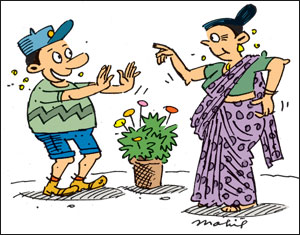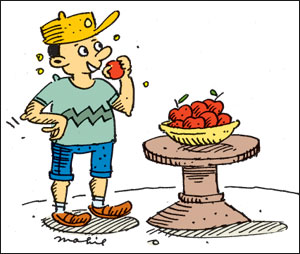|

by R. S. Karunaratne
Many uses of 'my'
'My' is a possessive determiner meaning 'belonging to' or 'related
to' me.
'My' is used to talk about our family members, partners, colleagues
or people we live with.
Meet my daddy.
|

Somebody has entered
my room! |
I am going to school with my mother.
My roommate is an undergraduate.
My hands are clean.
I always keep my house in order.
My can be used to refer to parts of my body.
I sprained my ankle.
My hair is growing fast.
'My' is used to talk about my clothes and other belonging.
My purse is missing!
Is that my toothbrush?
My shoes are very comfortable.
Did you wash my shirt?
'My' is used to talk about my home or school.
Can you come to my place tomorrow?
Somebody has entered my room!
I visit my home town once a year.
My school is situated in the capital.
'My' is used to talk about my personal information.
|

My hands are clean. |
My surname is Suranimala.
The policeman asked for my passport.
Set phrases
This is my seat, don't sit there.
My God! Look at this! (to show surprise)
My, what happened to you? (to show surprise)
Good morning, My dear. (to show affection)
Know the difference between 'my' and 'mine'.
As we know, 'my' is a possessive determiner.
It is always followed by a noun. However, 'mine' is a pronoun that
can stand alone.
Whose pen is this?
It's mine.
He is an old friend of mine.
Activity
Use my or mine in the blanks.
1. I ordered this book, so it must be ....... .
2. This is ..... pen. Why did you take it?
3. A friend of ...... is coming to see me.
4. Did you see ...... shoes?
5. I think that book is ...... .
6. That's not ....... fault.
7. ........ is a white car.
8. I have ....... own way of doing things.
9. It's not ........, you can take it.
10.That's ........ Don't take it.
******
Key
1. mine, 2. my 3. mine
4. my 5. mine 6. my
7. Mine 8. my 9. mine
10. mine.
******
Current English
usage
1. Affect, effect
These words are misused very often. To affect is to cause or
influence something to happen.
Smoking will affect your health.
An increase in busfare will affect the poor.
The clock tower was badly affected by the sudden explosion.
Some diseases mainly affect older people.
She was deeply affected by the novel.
Effect is the result of a particular influence.
Bushfires will have a serious effect on the environment.
The medicine she took did not have any effect on her.
Note: affect is usually a verb
Effect is usually a noun
2. accent, ascent, assent
Accent (pronounced Ax-sent) is the way in which people in a
particular area, country or social group pronounce words.
Sam has strong American accent.
Accent is also a mark written or printed over a letter to show you
how to pronounce it.
There is an acute accent on the 'e' of 'cafe'
Ascent (pronounced a-sent) is the act of moving or climbing upward.
Grandmother made her first ascent of Sri Pada last year.
His ascent to power was gradual.
Assent (pronounced a-sent) means to express agreement.
Once the chairman has given his assent to the proposal, all the
employees will enjoy higher salaries.
3. Accept, except
Accept means 'to agree to take something.
Some shops do not accept credit cards.
He will go to the United States to accept an award for his novel.
He did not accept responsibility for the failure of the plan.
Common mistake:
Accept is not usually followed by another verb.
He accepted to take me to the zoo. (wrong)
Say: He agreed to take me to the zoo.
Except means 'not including."
All the teachers joined the trip except the principal.
4. Actor, actress, authoress, poetess, sculptress
Before the word 'actress' was introduced 'actor' was used for both
sexes. Today there is a general return to actor. Similarly we no longer
use 'authoress, poetess or sculptress' because of the feminist view that
they are inferior expression. However, we still use 'heroine, heiress,
waitress and goddess' in our writing.
Starters:
Know what a
sentence means
A sentence may be a statement, a question, an exclamation, or a
command or request. A sentence always begins with a capital letter and
has an end punctuation.
Mother is cooking.
Kinds of sentences
A statement tells something and ends with a fullstop.
An apple a day keeps the doctor away.
Many children ordered chocolate ice cream.
|

An apple a day keeps the doctor away. |
Silva owns an ice-cream parlour.
An ant farm is interesting.
My aunt helps me in my studies.
A question asks something and ends with a question mark .
Is this your pen?
Can elephants swim?
Do you like to play chess?
Did you have a nice weekend?
Would you like to fly planes some day?
An exclamation shows strong feeling or surprise and ends with an
exclamation mark.
The cage door is open!
Swimming is exciting!
Oh, what a lovely doll!
Her son wants to join a circus!
What a dress you're wearing!
A command or request orders or asks for something. It has an
understood subject 'you'.
The end punctuation may be a fullstop or an exclamation mark.
Run fast!
Please sit down.
Please be careful when you handle glass.
Wait for me!
Let the cat out.
------
Gender quiz
There are four Genders in English grammar. They are: Masculine (male
creatures), Feminine (female creatures), common (creatures of either
sex) and Neuter (things of neither sex).
Match the Masculine Gender with the Feminine Gender and then refer to
the key.
|
Masculine Gender |
Feminine
Gender |
| 1. abbot |
A. murderess |
2. actor
|
B. mistress
|
3. author
|
C. Manageress
|
4. baron
|
C. Manageress
|
5. conductor
|
E. Jewess
|
6. count
|
F. instructress
|
7. duke
|
G. huntress
|
8. emperor
|
H. hostess
|
9. enchanter
|
I. Heiress
|
10. giant
|
J. goddess
|
11. god
|
K. giantess
|
12. heir
|
L. enchantress
|
13. host
|
M. empress
|
14. hunter
|
N. duchess
|
15. instructor
|
O. countess
|
16. Jew
|
P. conductress
|
17. lion
|
Q. baroness
|
18. manager
|
R. authoress
|
19. master
|
S. actress
|
20. murderer
|
T. abbess |
*******
Key1. T, 2. S, 3. R, 4. Q, 5. P, 6. O, 7. N, 8. M, 9. L, 10. K, 11.
J, 12. I, 13. H, 14. G, 15. F, 16. E, 17. D, 18. C, 19. B, 20. A.
****** |

